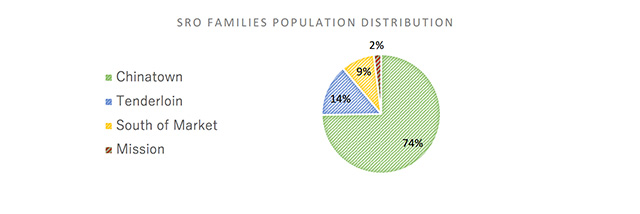Just another depressing local real estate factoid to kick off your week: According to a new census by the SRO Families United Collaborative, there's been a 55 percent uptick in the number of families, sometimes comprising four or five individuals, sharing single-room occupancy apartment units since 2001 most of these in Chinatown. And mind you, these are often 8-by-10-foot rooms meant for single individuals, typically with shared bathrooms and kitchen facilities.
The new census, done in 2014 and released via this new report, found that the median price for an SRO unit is now $1,000 a month in SoMa, and $700 a month in Chinatown, and a majority of heads of households are immigrants who do not speak fluent English. 38 percent earn wages in the restaurant industry, while others work in hotels, janitorial services, construction, and sewing factories. And there are now 699 families living in these conditions, an increase of 249 families over the past decade.
The vast majority of families living in cramped SROs, 74 percent, are in Chinatown, with another 14 percent in the Tenderloin, with a decreasing number (2 percent) in the Mission, largely due to gentrification. 40 percent of these families consist of four or more individuals, and over 95 percent of the individuals are employed.

Living conditions, in addition to being cramped, are often illegal and disgusting. City Attorney Dennis Herrera filed suit in 2014 against one SRO landlord, the Thakor family, as KRON 4 notes. They own at least 15 SRO buildings with some 880 units where residents "were forced to endure bedbugs, roach and rodent infestations, mold and mildew, raw sewage leaks, defective wiring, and other unsafe conditions," according to the complaint. The Thakors ultimately agreed to pay $1.1 million to rectify these unlivable conditions.
Furthermore, most of these families have applied for subsidized family housing through the city, but very few have succeeded in getting it. The report says that 88 percent of the families have been on housing waiting lists for a year or more, 60 percent for three years or more, and 14 percent for over 10 years. Meanwhile, most of them (62 percent) don't have leases in their SROs, putting them at risk of displacement to make way for white-collar workers and students to whom SROs are often being marketed, as we've seen in the Apartment Sadness column.
The report recommends that families in SROs be given greater priority on housing waiting lists, and that the city do something to halt evictions of these families and stop the conversion of SROs into student housing or tech hostels, as we've seen happening already across the city.
Related: Adding Roommates Made Easier, Evictions Made Harder After Board Of Supervisors Vote
via SRO Families United Collaborative
